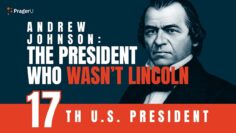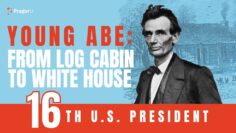Free the Freelancers
What’s the best way to protect the rights of workers? Let them determine their own job preferences, or mandate that companies provide them with certain protections? California has chosen to take the latter path. Has it worked? Is it a victory for workers, or a debilitating defeat? Patrice Onwuka of the Independent Women’s Forum looks into these questions. Her findings may surprise you. For more information on Independent Women’s Forum, go to iwf.org/AB5
FOLLOW us!
Facebook: 👉https://www.facebook.com/prageru
Twitter: 👉https://twitter.com/prageru
Instagram: 👉https://instagram.com/prageru/
SUBSCRIBE so you never miss a new video! 👉 https://www.prageru.com/join/
To view the script, sources, quiz, visit https://www.prageru.com/video/free-the-freelancers
Join PragerU’s text list to have these videos, free merchandise giveaways and breaking announcements sent directly to your phone! https://optin.mobiniti.com/prageru
Do you shop on Amazon? Click https://smile.amazon.com and a percentage of every Amazon purchase will be donated to PragerU. Same great products. Same low price. Shopping made meaningful.
SHOP!
Love PragerU? Now you can wear PragerU merchandise! Visit our store today! https://shop.prageru.com/
Script:
Workers of the world unite—to protect your freedom.
You have nothing to lose, but your jobs…
Which is exactly what is happening in California.
And threatening to spread to the rest of the country.
Just what we need, right?
Fewer jobs and fewer people employed.
Why is this happening?
Exhibit A:
Assembly Bill 5 or AB5, as it’s commonly known.
Passed by the California legislature in September of 2019, AB5 was authored by a former union boss Assemblywoman Lorena Gonzalez. The stated goal was to protect freelance workers from employers taking advantage of them. Instead, it has pushed thousands of these workers into the unemployment line.
Here’s why:
Workers in the United States are classified as either employees or independent contractors, sometimes known as freelancers.
Independent contractors are self-employed and contract their labor to one or more firms. The upsides to this arrangement are clear: Freelancers decide whom they work for, when, where, and how. They are their own boss.
So, then, what are employees?
Employees typically work for one employer. In exchange, they are entitled to workplace benefits and protections that independent contractors are not — such as healthcare, time off, minimum wage, and unemployment insurance.
We don’t have to agree which kind of employment is better. Different people have different preferences. It’s called choice.
But some people — specifically, unions and progressive politicians—are anti-choice.
AB5’s author Assemblywomen Gonzalez disdains freelance work. “These were never good jobs,” she says.
Oh really?
She might want to talk to some of the 2 million Californians or the 57 million Americans who freelance. 46% of those workers happen to be women.
Of course, the AB5 supporters would say the law is needed because companies, especially gig economy firms such as Uber and Lyft, willfully misclassify workers as freelancers to avoid providing benefits.
Why not ask the workers themselves?
Well, pollsters have.
According to a McKinsey study, nearly 80% of gig workers say they’re happier than those working traditional jobs. They love their freedom and also earn a good living. In fact, over 17 million freelancers quit their traditional job to freelance and two out of three of them say they earn more now than before.
For the majority, their new incomes outpaced their previous salary within just one year.
Half of the freelancers say they would not take a traditional job no matter how much they were offered.
And, in a survey of female gig workers, nearly two out of three women who have a side job prefer being independent contractors over being employees.
AB5 has already done damage. It has wiped out the livelihoods of many independent contractors and will limit new opportunities in the future.
Freelance writers and journalists have been especially hurt. The law includes a provision making it illegal for them to produce more than 35 pieces of content in a year for a single company.
Left-leaning Vox Media hailed the bill’s passage as “a victory for workers everywhere” then turned around and laid off 200 freelance writers rather than make them full-time employees.
The ride-sharing industry estimates that AB5 will increase their labor costs by 20–30%. As a result, rideshare companies may schedule drivers in advance and reduce the number of drivers during slow hours or in less busy markets. For customers, this means longer wait times, fewer available rides, and higher prices. For drivers, it means reduced flexibility and reduced income. It may also kill hundreds of thousands of jobs.
For the complete script visit: https://www.prageru.com/video/free-the-freelancers
source










